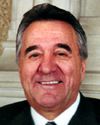Mr. Speaker, I think something was lost in the translation because my question was on whether it should be a free vote or not.
The Firearms Act has already cost taxpayers $1 billion. Taxpayers want to know when it will become $2 billion. A succession of ministers in charge of this have kept Parliament in the dark since December 2002.
Why will the Minister of Public Safety not stop this cover-up today? Just tell us, how much is the gun registry going to fully cost to implement and how much will it cost to maintain? It is a simple question. How about an answer?











